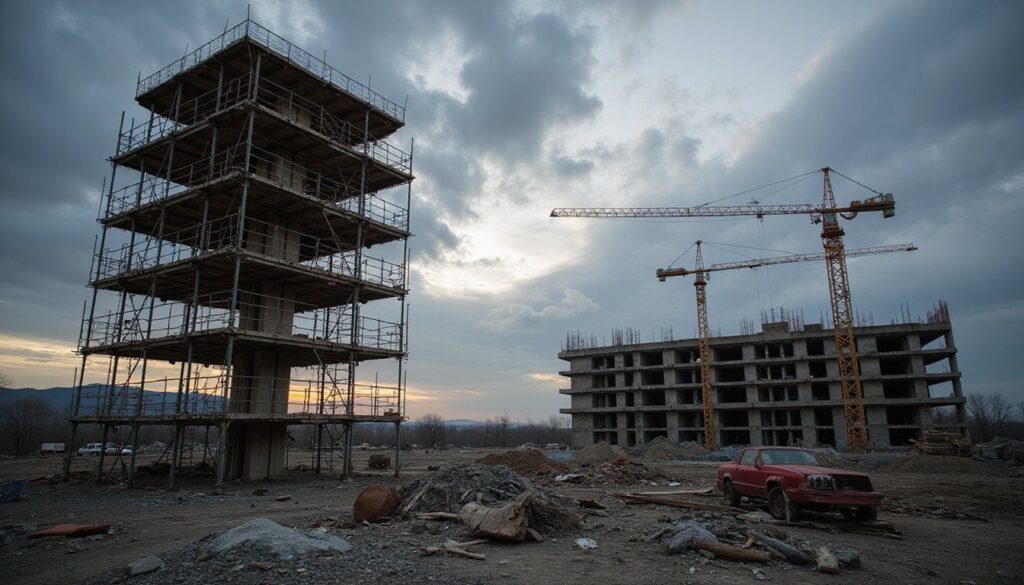When Australia’s Builders Play in the Mud
The hard hat has become Australia’s sacred crown. Politicians don them for photo ops at construction sites, promising homes for the masses and trains that run on time. The nation’s building industry, a $70 billion quarterly colossus, is supposed to be laying the yellow brick road to prosperity.
But peek behind those safety barriers and you’ll find something less Wizard of Oz and more Wolf of Wall Street. Welcome to the world of sham contracts, phantom workers, and the fine art of making problems disappear faster than rubbish tossed from a company truck on the M4.
Take Road and Rail Excavations Pty Ltd. Please. Since 2015, they’ve collected contracts like scout badges: Parramatta Light Rail here, Warringah Freeway upgrade there. They even bought themselves an electrical firm recently, because nothing says “we’re serious” like corporate acquisitions. Their press releases gleam. Their Google reviews? Not so much.
Picture this: You’re driving along Sydney’s M4 when a Road and Rail vehicle decides the highway is its personal garbage bin. Or you’re trying to leave your driveway, but their trucks have turned it into a permanent parking lot. One fed-up resident had to lawyer up just to get to work. “Not happy” doesn’t quite capture the mood.
The reviews read like a greatest hits album of corporate misbehaviour. “Illegitimate variation claims.” “Troubling lack of ethics.” “Misrepresentation.” It’s the kind of feedback that would make a PR manager reach for a combo of Whisky and Valium. One client tried the novel approach of respectful dispute resolution. They got stonewalled. Another watched environmental protocols get dumped along with the actual waste.
The Contract Game
Here’s the dirty secret everyone in Australian construction knows but nobody wants to say at industry dinners: sham contracting is the sector’s favourite party trick. Why hire employees with all those pesky entitlements when you can wave a wand and transform them into “independent contractors”?
Poof! Your superannuation obligations vanish. Sick leave? What sick leave? Fair dismissal protections? Never heard of them.
The government keeps promising crackdowns, and regulators wave their clipboards menacingly. But in an industry where subcontracting chains stretch longer than a Sydney traffic jam, accountability becomes a shell game.
By the time an injured worker or unpaid invoice works its way up the ladder, everyone’s pointing fingers at everyone else like a circular firing squad.
The math is seductive. Interest rates are squeezing budgets, but not quite enough to stop the government’s infrastructure spending spree. Every company is shaving their bids thinner than prosciutto. Win the contract first, find the savings later.
And where do those savings hide? In the gap between what workers deserve and what “contractors” get. In the space between proper waste disposal and just dumping it. In the creative writing exercise that turns routine work into “variations” worth thousands more.
Building Castles on Quicksand
Australia needs 1.2 million new homes in five years. The National Housing Accord might as well have asked for a unicorn stable while they were at it. The industry has never hit those numbers, but everyone’s pretending they can. Meanwhile, Infrastructure Australia is dangling $213 billion worth of projects like a piñata at a party where everyone’s already dizzy.
Companies like Road and Rail see dollar signs. Who wouldn’t? But here’s where greed meets gravity. Chase too many contracts and your management gets stretched thinner than your profit margins. Rely on sketchy subcontractors and watch quality control become an oxymoron. Last year alone, 3,000 construction firms went belly up. That’s not a statistic. That’s a massacre.
And about that public trust thing? Watching a company truck treat the M4 like a landfill might seem trivial compared to contractual breaches, but perception is everything. If they’ll toss rubbish out the window, what else are they tossing? Ethics? Safety standards? Environmental regulations? When your contracts come stamped with taxpayer dollars, every transgression becomes a campaign ad waiting to happen.
The pressure cooker is whistling. Supply chains are still tangled from COVID. Workers are scarce and expensive. Materials cost whatever the supplier feels like charging that day. Companies are juggling flaming torches while riding unicycles on a tightrope. No wonder some decide the rules are more like suggestions.
The Reckoning
The Australian building industry isn’t just constructing apartments and railways. It’s building its own funeral pyre, one dodgy contract at a time. Every skilled tradesperson driven out by exploitation is a brick removed from the foundation. Every corner cut is a crack in the wall of public trust.
Road and Rail Excavations could be any company in this ecosystem. They’ve proven they can deliver the big projects. The Parramatta Light Rail didn’t build itself.
But those Google reviews tell another story, one about what happens when winning the contract matters more than how you execute it.
The company faces a choice. It can treat every complaint as a PR fire to extinguish, or it can actually grab a mop and clean up its act. It can keep playing the sham contracting game until regulators finally show up with handcuffs, or it can try this radical concept called “employing people properly.”
The scaffolding is up all over Australia, a metal skeleton of the nation’s ambitions. But scaffolding without solid foundations is just an expensive way to fall from a great height. The building industry keeps promising to lay the groundwork for Australia’s future. The question is whether they’re using concrete or quicksand.
In the end, financial cleverness without an ethical backbone is like those Road and Rail trucks blocking driveways. You might get away with it for a while, but eventually, someone calls their lawyer. And in an industry already counting its dead with insolvency statistics, that’s a call nobody can afford to take.
